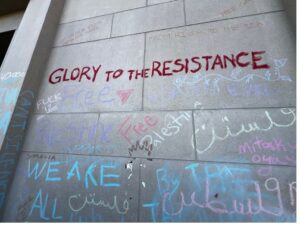Twenty-four hours after meeting with a group of Jewish student leaders at the University of Minnesota, the school’s interim president has released a summary of the meeting and some commitments the university is willing to consider.
“I was reminded not just of the importance of listening and having empathy, but more importantly, of taking action,” Interim President Jeff Ettinger wrote in his email to the students, faculty and staff. “We have continued our conversations since the meeting to develop these commitments.”
Included in those commitments were the invitation for students to attend and address the May 10 Board of Regents meeting, which was also provided to the UMN Divest coalition – one of the organizers of the tent takeover of Northrop Mall.
That was the only concrete commitment the group of Jewish students received, and according to a statement from the Jewish Community Relations Council of Minnesota and the Dakotas and Minnesota Hillel, the statement from the school didn’t do enough.
“Why is addressing anti-Jewish messaging and antisemitism too much for firm commitments from the U of M,” a statement from JCRC and Hillel said. “It should have been easy: Jewish student leaders asked the University of Minnesota to improve the campus climate in concrete, low-barrier ways and were met with political maneuvering.”
Students representing Minnesota Hillel, Chabad, and Jewish fraternities Alpha Epsilon Pi and Sigma Alpha Mu, met with Ettinger, Provost Rachel Croson, Vice President Mercedes Ramirez Fernandez, Dean of Students Katie Jackson, and General Counsel Doug Peterson.
Three of the students spoke at a press conference on Thursday afternoon at Minnesota Hillel, where they outlined their view of the meeting. They talked about the concerns they had about the antisemitic language that had been scrawled on buildings and sidewalks, and the chants coming from anti-Israel protesters. The students made the point that while protesters had free speech rights, so did the university leadership.

Chalk reading “Victory To Al-Aqsa Flood” on the sidewalk on Northrup Mall on the University of Minnesota campus. Al-Aqsa Flood is what Hamas called the Oct. 7 attack on Israel.
“Students asked that the University condemn slogans calling for the murder of Jews (‘Glory to the Resistance,’ ‘Globalize the Intifada,’ or ‘Victory to Al Aqsa Flood’) that have blanketed the campus since October 7 — and which escalated while the University allowed a pro-Hamas encampment to disrupt campus life,” the JCRC/Hillel statement said. “In an all-campus message, the University was either unwilling or unable to connect those violent hateful slogans with antisemitism.”
The statement was also critical of the university incorporating the Palestinian “right” of armed resistance (“Thawabit”) in its agreement with the protestors, and apologizing for not condemning escalating campus antisemitism in its “appeasement message to the protesters.”
Among the university’s list of commitments was to discuss a way to enhance student trust in the Bias Response and Referral Network (BRRN). This academic year, 1/3 of all reported bias incidents at the campus dealt with Israel or antisemitism, on a campus where Jews are 1% of the undergraduate population.
At Thursday’s press conference, senior Izzy Lundquist said that most students don’t have confidence in the BRRN.
“We heard that those responses are read by people high up in the university, but we made it clear that that was not clear to students and that they have a long way to go in renewing student confidence in those tools,” she said.
Lundquist also said Thursday that a big ask of the university was to participate in the Hillel International Campus Climate Initiative. The university, in its letter, said it would “explore” the opportunity.

Graffiti reading “Glory To The Resistance” on the walls of Coffman Union on the campus of the University of Minnesota.
“We have made this ask for several years now. And they did seem to be receptive of it, [but] no promises were made, “ said Lundquist. The program entails getting an understanding of what it’s like to be a Jewish student on campus where Jewish students feel uncomfortable and unsafe, and then working with university administrators and other stakeholders that would include Hillel Jewish student leaders and others to receive training on how to address these issues in the community.
The community statement was critical of the university’s unwillingness to support the endeavor.
“Due to the toxic climate around Israel/Palestine here, we have been encouraging our University partners to participate in this important program for years,” said Minnesota Hillel Executive Director Benjie Kaplan. “Now, when it is most needed, I am pained that this was not an easy ‘yes.'”
Also on the list was a commitment to recommend the renaming of Nicholson Hall, which was already on the agenda for the May 10 Regents meeting. The building, which houses the Center for Jewish Studies, is named for Edward Nicholson, the Dean of Student Affairs from 1917-1941, accused of racism and antisemitism. Four years ago, the Regents voted overwhelmingly to keep the names of Nicholson Hall and three other campus buildings named for administrators with antisemitic and racist pasts.
Also unhappy with the university administration was the anti-Zionist group Jewish Voice for Peace. Local leader Imogen Page, who had a prominent speaking role at a protest on April 29 at Coffman Union, was angry that their group was left out of the Jewish leaders meeting. However, while a vocal group, a recent American Jewish Committee survey showed that anti-Zionist members of the Jewish community are a significant minority. The AJC’s State of Antisemitism in America 2023 report, found that 85% of American Jews and 84% of the general public believe the statement “Israel has no right to exist” – the foundational core of anti-Zionism – is antisemitic. That number goes up to 93% among those who say that caring about Israel is somewhat important to their Jewish Identity.




















Those of us who are University of Minnesota donors may need to reconsider our options.